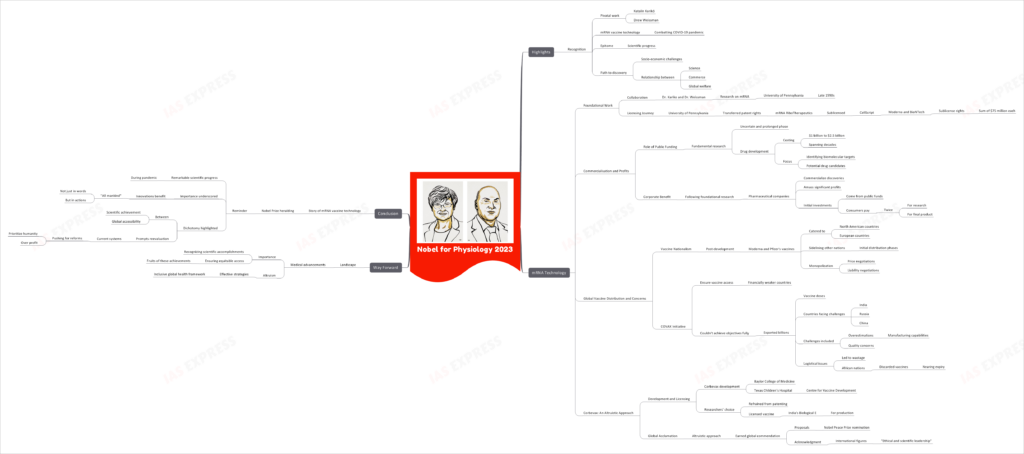Nobel for Physiology 2023- What does it Miss?
The 2023 Nobel Prize for Physiology or Medicine recognizes the pivotal work of Katalin Karikó and Drew Weissman in developing the mRNA vaccine technology, instrumental in combating the COVID-19 pandemic. Their achievements signify the epitome of scientific progress, yet the path to this groundbreaking discovery intertwines with complex socio-economic challenges, highlighting the nuanced relationship between science, commerce, and global welfare.

Development of mRNA Technology
Foundational Work
- Duo’s Collaboration: Dr. Kariko and Dr. Weissman commenced their collaborative research on the mRNA platform at the University of Pennsylvania in the late 1990s.
- Licensing Journey: The University transferred its patent rights to mRNA RiboTherapeutics, which in turn sublicensed to CellScript. Subsequently, Moderna and BioNTech obtained the sublicense rights for a sum of $75 million each.
Commercialisation and Profits
- Public Funding Role: Fundamental research, often the most uncertain and prolonged phase of drug development, relies heavily on government and public funding. This phase, costing between $1 billion to $2.5 billion and spanning decades, focuses on identifying biomolecular targets and potential drug candidates.
- Corporate Benefit: Following this foundational research, pharmaceutical companies commercialize these discoveries, amassing significant profits. Notably, the initial investments often come from public funds, essentially leading to consumers paying twice – first for research and then for the final product.
Global Vaccine Distribution and Concerns
- Vaccine Nationalism: Post-development, Moderna and Pfizer’s vaccines primarily catered to North American and European countries, sidelining other nations in initial distribution phases. This monopolization was further exacerbated by price and liability negotiations.
- COVAX Initiative: Aimed at ensuring vaccine access to financially weaker countries, the COVAX initiative couldn’t achieve its objectives fully. Despite exporting billions of vaccine doses, countries like India, Russia, and China faced challenges ranging from overestimations of manufacturing capabilities to quality concerns. Additionally, logistical issues led to wastage, with several African nations discarding vaccines nearing their expiry.
Corbevax: An Altruistic Approach
- Development and Licensing: Corbevax, developed by the Baylor College of Medicine and the Texas Children’s Hospital Centre for Vaccine Development, took a distinct path. The researchers refrained from patenting it, licensing the vaccine to India’s Biological E for production.
- Global Acclamation: Their altruistic approach earned them global commendation, with proposals of a Nobel Peace Prize nomination and acknowledgment from international figures for their “ethical and scientific leadership”.
Way Forward
In the landscape of medical advancements, it’s crucial to strike a balance between recognizing scientific accomplishments and ensuring equitable access to the fruits of these achievements. Altruism, coupled with effective strategies, can pave the way for a more inclusive global health framework.
Conclusion
The story of mRNA vaccine technology, as heralded by the Nobel Prize, serves as a reminder of the remarkable scientific progress made during the pandemic. Yet, it also underscores the importance of ensuring that such innovations truly benefit “all mankind”, not just in words but in actions. The dichotomy between scientific achievement and its global accessibility prompts a reevaluation of our current systems, pushing for reforms that prioritize humanity over profit.
Practice Question for Mains
The 2023 Nobel for Physiology acknowledges work that has created benefits “for all mankind”. Evaluate. (250 words)
If you like this post, please share your feedback in the comments section below so that we will upload more posts like this.
